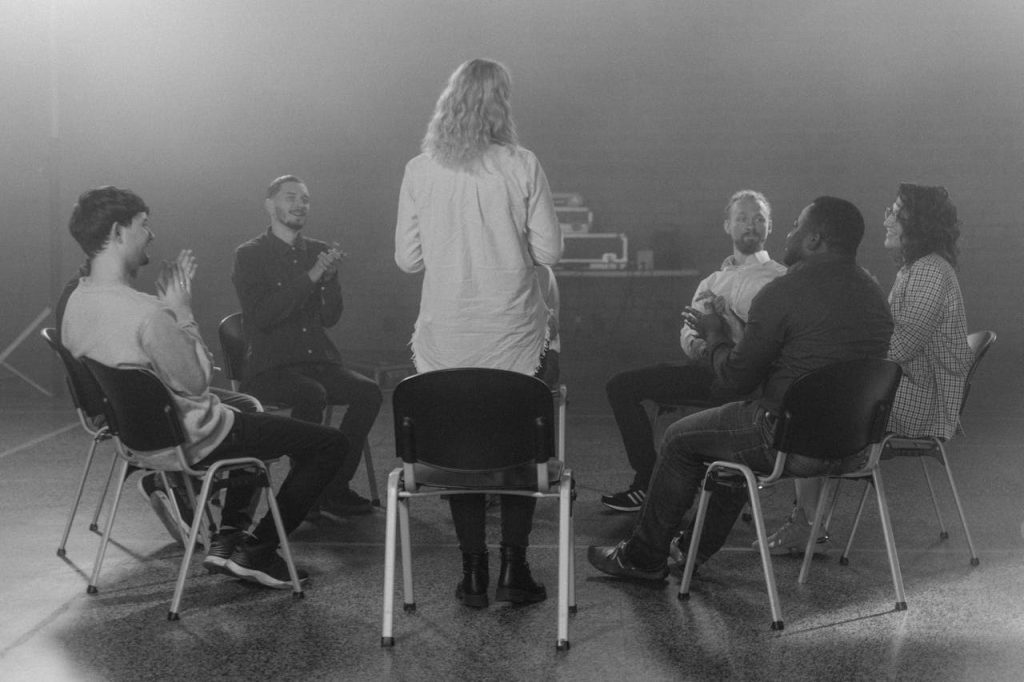Your first sessions with a therapist for life transitions may begin with broad questions about your life, primary concerns, and objective for change. Therapists utilize this period to establish a secure environment, outline the mechanics of sessions, and see what you hope for from assistance. Anticipate taking it slow, with the therapist inquiring about your narrative, what led you to seek help, and your aspirations for the process. Mostly we’ll be talking about how you feel and what you want to change. Therapists might discuss confidentiality policies and what to anticipate going forward. First sessions lay the groundwork for trust and help you feel heard. The following passages describe what occurs and how to prepare.
Key Takeaways
- When you prepare for your first therapy session by identifying your goals, thinking about your mental health history, and jotting down questions, you can enter the experience with confidence and clarity.
- Mindful Preparation & Emotional Readiness Engaging in preparation and emotional readiness techniques—like mindfulness and vulnerability acknowledgment—can reduce nervousness and promote openness in your session.
- Taking care of action items such as intake paperwork and appointment confirmation sets a smooth and efficient tone to get you focused on what matters: your process.
- The first session is an opportunity to share your story, answer questions about your mental health, and discuss treatment goals — all in a confidential and supportive environment.
- From building rapport to making sure you feel at ease with your therapist, these steps instill a trust that is the cornerstone of both effective therapy and good personal results.
- Post-session, thoughtful reflection will guide you in deciding on next steps, resizing your goals if needed, and ascertaining whether the therapist’s style fits your needs.
Preparing for Your First Session
Beginning therapy for life changes can feel new and weird. The first session is nerve-wracking, but a little preparation goes a long way to reliving the stress. Reflect on what you desire from therapy, what you’ve encountered in the past, and what you aspire to achieve by engaging with a therapist. This is your moment to see whether the therapist vibes with you and for them to get to know you.
Mindful Preparation
We all get nervous before our first session. Perhaps a brief breathing exercise or a body scan would help your mind slow down. Imagine what a great first talk might be like for you. This confidence can help build some trust in yourself and the process. Prepare your environment — staying home or heading into an office — so you’re not hurried. Note down subjects or emotions that arise. Or perhaps you want to discuss a significant transition, an unexpected layoff, or a sense of stagnation, so you don’t blank in the moment.
Emotional Readiness
Ask yourself if you feel ready to open up, even just a bit. It’s natural to dread being judged or misunderstood, naming these worries before you begin can help. Remind yourself that to be candid, even if it’s saying, “I don’t know what to say,” is sufficient. Anticipate a little jitter, it tends to dissipate as the session commences.
Practical Steps
Complete any forms and verify the time, address or video link for your session. Bringing a notebook can assist you in following key points or new emotions as you discuss. Have your insurance card or payment info at the ready if necessary. Map your way to the office and factor in extra time for traffic or delays — the sooner, the better to get settled. Here’s a checklist to keep you on track:
- Intake paperwork complete
- Appointment details confirmed
- Insurance and payment info ready
- Notebook and pen packed
- Route and travel time planned
What to Ask
- What is your experience with life transitions?
- How do you structure sessions?
- What happens if I need to reschedule?
- How do you protect my privacy?
What Happens in the First Session?
The initial session with a therapist is an organized opportunity to collect information and exchange preliminary reactions. A majority of the session is spent creating an environment where you feel comfortable talking and the therapist can hear, understand and learn about your goals, background, and life changes. To try and determine if this therapist is right for you. Below is a table showing the core steps you may encounter:
Step | Key Elements |
Welcome | Introduction, explanation of process, confidentiality, setting expectations |
Your Story | Sharing background, recent changes, emotional context, clarifying questions |
The Questions | Mental health history, symptoms, coping methods, prior therapy experiences |
The Approach | Therapy style, tailored plan, session structure, expectations |
The Plan | Initial goals, possible techniques, progress check-ins, communication |
The Welcome
The first session begins with a hello! The therapist might explain how they work—some tend toward talk therapy, some tend to incorporate practical exercises. They’ll describe the session’s format and what you can expect today. Most will emphasize that all is confidential, and only shared by law with your permission, unless you’re a danger.
Your Story
You get to share your story, emphasizing what led to your visit – perhaps a relocation, new position, change in family dynamics. The therapist can inquire about pivotal moments that influenced your mood or attitude. Barking about how you’re feeling—loss, hope, stress—can assist the therapist understand your world more. You’ll find you get invited to elaborate or clarify some points to ensure your concerns are captured.
Sharing what’s hard or what’s changed can be nerve-wracking. This is natural, and therapists anticipate it.
The Questions
Therapists will inquire about your psychiatric history. They may inquire about family mental health, but not necessarily. We’ll talk about your symptoms—such as sleep, appetite, or stress at work. They might inquire how you’ve dealt in the past, what’s been of assistance or not. If you’ve done therapy previously, divulging what worked (or failed to) steers their treatment plan for you.
You could discuss mini-targets, like being less anxious or sleeping better.
The Approach
You’ll find out how the therapist operates. They describe whether they employ talk therapy, cognitive tools, etc. You’ll talk about whether their approach matches your desires and needs. Understanding what your sessions might look like, and how often you’ll meet can help you plan.
You can always inquire about fees or session policies if not addressed.
The Plan
Together, you begin a plan. You could have short-term goals, like less stress or more energy. The therapist might recommend techniques. You’ll agree on how to check progress.
Email, phone, or app—pick how to stay in touch.

The Human Connection
It’s the human connection that is at the heart of therapy. Studies estimate that 30–60% of people only come to one session, so connecting during your initial meeting is essential. This initial session is not for quick breakthroughs. Instead, it’s about building trust and safety with your therapist. Comfort might be slow. It’s ok to be tentative initially. That initial session is a collaborative process, with the therapist and client together working to establish goals and determine whether or not the relationship is a fit.
Assessing Rapport
Pay attention to how you feel with your therapist in that first session. Do you feel warmth and openness in their greeting or reply? Notice how they listen. Is their body language loose? Do they nod or make room for you to speak?
A good therapist’s style fits your comfort zone. Perhaps you enjoy softer questions or maybe you want to get right to the point. If you are said to be ‘getting’ it, or being validated, then this is great evidence of good rapport. If you sense your worries are dismissed or misinterpreted, that’s something to consider. For instance, if you blabber about a recent big move and your therapist calmly verifies what you’re thinking and feeling, you might feel validated. If they race ahead or jump to give advice, you may not.
Trusting Intuition
Your gut can steer you in these initial encounters. If you feel comfortable, honored and secure, that’s key. Perhaps you observe your therapist maintains eye contact or allows you the silence to formulate your thoughts. That feeling of respect counts.
If you sense values that are aligned with yours, believe it!] For instance, if you prize open-mindedness and your therapist appears nonjudgmental, that’s a reassuring indicator. If you’re feeling persistent pain or anxiety, you shouldn’t brush it off. That can be a signal to experiment with another therapist, which is all pretty standard.
Feeling Heard
To be heard is the foundation of quality therapy. Does your therapist echo your own words in a mirroring that makes you feel heard? If you discuss stress at work and your therapist encapsulates it without dropping the nugget, that’s a potent illustration.
If you walk away from the session believing your story counts, that’s what you desire. If not, it’s OK to say something or to seek a better fit.
Navigating Your Emotions
Navigating your emotions in your initial therapy session is something that requires patience. You may feel anxious or even terrified, particularly if you are navigating through major life transitions. Most people come away from that first session spent, and it’s okay to feel worse before you feel better. That’s because therapy can stir up deep and at times uncomfortable emotions worth addressing. Validating and verbalizing these responses is an important piece of the labor. Your therapist helps you set goals and build trust, which are both the basis for moving forward.
Acknowledging Fear
A lot of us are anxious about telling our stories to a therapist — worrying they’ll judge or misunderstand us.
As with many fears, this one can make it difficult to talk openly, causing others to hide information that feels significant. It’s normal to fret if you’re saying the ‘correct’ thing or if your emotions are excessive. Other times, this fear manifests as an urge to ditch sessions, restlessness, or insomnia.
One way to handle this is to name your fears out loud. Inform your therapist if you’re feeling uncomfortable or uncertain. It does both build trust and allows you to practice confronting difficult feelings in a secure environment. Gradually, confronting these fears in therapy can make you feel bolder and more vulnerable outside the session as well.
Embracing Vulnerability
It’s not easy to be open, but it’s necessary for genuine growth in therapy.
You could feel vulnerable discussing intimate moments. Most are afraid they’ll be perceived as weak if they weep or discuss failures. Just keep in mind, there’s strength – not weakness – in vulnerability. When you share your struggles, you allow your therapist to know what is most important to you. This candor creates a more profound, useful connection.
Greater vulnerability can result in more practical feedback and assistance. It allows you to establish concrete objectives with your therapist and collaboratively achieve them.
Sharing Emotional Responses
Others feel drained or even body tense after an initial session. This is a natural step in working through powerful emotions.
You might experience shifts in your mood or sleep. These are natural responses. Labeling your emotions, such as sadness or relief, provides clarity.
It’s fine to discuss these responses with your therapist. It helps you learn new ways to cope with stress.
Normalizing the Process
Emotional ups and downs are expected in therapy.
Most of us require two or three sessions to determine if the shrink is a good fit.
The Unspoken Contract
Your initial visit to a life-transition therapist is driven by an unspoken contract. It’s more than the contracts you ink or the dialogue. It’s the foundation of trust, respect and security that guides the way to genuine advancement. Based on trust and respect, it safeguards your needs and the therapist’s position, even if silent. Understanding its components allows you to maximize your therapy experience.
Understanding Confidentiality
Confidentiality is key in therapy. It means what you share in the room remains. Your therapist can’t discuss you or your story in any public forum, unless you provide explicit permission. The only times this varies is if you discuss harm to self or others, or if law demands it. Even then, your therapist should describe what will be disclosed and why. This rule is more than a formality. It’s what makes the room secure. Without it, truth is difficult. You can discuss hesitation, concerns and transitions with no fear of leaks or criticism. Therapists are trained to be unbiased, and confidentiality helps maintain that. It’s a breathing oath that allows you to chase life transitions fearlessly.
Confidentiality Standard | What You Can Expect | Exceptions |
Session Privacy | Your details are never shared | Risk of harm, legal reasons |
Non-Judgmental Listening | No judgment on what you disclose | As mandated by law |
Secure Records | Files are protected and locked | Only shared with your permission |
Clear Communication | Therapist tells you about any disclosure | Always explained first |
Setting Boundaries
You don’t need to discuss everything in the initial session. Some things might be too raw or personal. You can inform your therapist what you are ok to discuss. If a topic feels taboo, mention it. It’s your palace, your boundaries count. The therapist should honor this, never exerting excess pressure or momentum. Gradually you might sense security to reveal more, but that’s up to you. For a relationship to be healthy, it requires both sides respecting each other’s boundaries. Boundaries are never static. As you get older, return to them and make changes.
The Role of Mutual Respect
Mutual respect is the unspoken contract. Your therapist respects your narrative, your rhythm, your decisions. You, in exchange, honor their talent and the craft. If you feel listened to, you’re more likely to be receptive. If you like the therapist’s approach, you’ll trust the space. This respect nurtures over time, forged by candid critique and mutual ambitions.
The Evolving Nature of the Contract
The unspoken contract isn’t carved in stone. It can move as your needs change. If you relocate, encounter new challenges, or require a new focus, talk about it. Cultural and individual histories can influence what seems comfortable. If something smells fishy, mention it early. Most therapists embrace this conversation.
This contract can be as potent as any written law.
It adapts as you do.

After the First Hour
Immediately following your initial therapy session, it’s good to take a moment and check-in with yourself. That first hour is primarily about meeting your therapist, exchanging pleasantries, and establishing expectations. Therapists might reserve the final minutes to have you ask questions or provide a brief summary. Occasionally they provide mini assignments—such as journaling or mood tracking—to attempt before next time. This initial session, sometimes referred to as an “intake,” is about establishing a foundation—not curing all your ills. Recurring sessions, often weekly or biweekly, will begin to construct on what you talked about.
Immediate Reflections
Give yourself a couple minutes alone, let your emotions calm. It’s natural to experience a combination of relief, bewilderment, or even apprehension. These emotions are natural—therapy is a significant milestone.
If anything from the talk leapt out, jot it down. This might be a phrase or question, or even a feeling you observed. For instance, perhaps you discovered you’re afraid of change more than you suspected, or that you’d like to work on trust. Capturing these points helps you see your growth down the road.
Next, consider the session in the context of your own goals. Did you have the opportunity to express what you wished? Did the therapist hear you in a way that kept you safe? If you have objectives concerning dealing with stress or grasping life transitions, jot down if you feel in line. Note any questions that you want to raise at your next meeting. Maybe you’re uncertain about the approach, or you desire additional input.
Deciding Next Steps
Look back on your session and ask yourself: Did you feel heard and understood? Was the therapist’s style a good match for you? Use this checklist to guide you:
- Did I feel safe sharing?
- Was the session well structured?
- Were my questions answered?
- Did I leave with something to think about?
If you answered yes to most, it may be time to schedule your next session. If not, it’s fine to experiment with someone else–fit counts. You might want to tweak your therapy goals based on what arose in that first hour. Perhaps you want to zone in on career stress, or discuss family change instead.
Occasionally, you’ll find that you want additional support beyond therapy. It might entail discussing it with your friends, participating in a support group, or researching life transitions. The key is to just keep moving, even if it’s in small increments.
Conclusion
First therapy sessions can often feel awkward and unfamiliar. Most of us arrive with scrambled minds and hesitant aspirations. That’s what a good therapist does — helps you take those big feelings and break them down into smaller pieces. You get room to converse, to inquire, to hear. Trust builds slowly, with every word or silent moment. The work isn’t over in that initial hour, but the door cracks open for transformation to begin. You don’t need to immediately know everything. Every step matters, even the tiny ones. Begin by sharing what feels safe. Request what you require. Be patient with yourself. Growth has its own schedule. If you want to learn more or want advice for your own next step, read our other guides or get in touch.
Frequently Asked Questions
1. What should I bring to my first therapy session for life transitions?
Bring any notes on your emotions, transitions, and queries. It assists to bring an open mind and a readiness to communicate.
2. Will my therapist judge me during the first session?
No, therapists hear that all the time — they’re trained to listen without judgment. Their focus is on being there for you, hearing what you have to say, and making you feel at ease.
3. How long does the first therapy session usually last?
The majority of initial sessions are approximately 50 to 60 minutes in length. This provides ample time to talk about your history and motivations for seeking assistance.
4. Can I talk about anything during my first session?
Of course you can discuss whatever is on your mind. The session is a safe space for you to open up.
5. What if I feel nervous or emotional during my first session?
Feeling nervous or emotional is to be expected. Therapists anticipate this and will relax you as you chat.
6. Is everything I say in therapy confidential?
Yup, therapists are discreet. They only disclose if legally required or if there is a safety concern.
7. What happens after my first session with a therapist?
Following your initial appointment, you and your therapist might establish goals and consider next steps. You can discuss together whether to proceed with additional sessions.
Reignite Your Potential: Transform Your Future With a Therapist for Life Transitions at Pivot Counseling
Feeling stuck, overwhelmed, or uncertain about your next chapter? You’re not alone—and Pivot Counseling is here to support you through life’s turning points. Working with a therapist for life transitions can help you reconnect with your purpose, navigate challenges with clarity, and move forward with confidence.
Imagine easing the weight of stress and indecision, improving your relationships, building emotional resilience, and feeling more grounded in who you are and where you’re going. At Pivot Counseling, we tailor every session to your unique life journey, using evidence-based strategies to help you make meaningful, lasting change.
Why wait to feel more in control, more hopeful, and more aligned with your goals? Contact us today to schedule a session with a therapist for life transitions at Pivot Counseling. Your new direction starts here.
Disclaimer:
The information on this website is for informational purposes only and is not a substitute for professional medical advice, diagnosis, or treatment. Always seek the advice of your physician or qualified health provider with any questions regarding a medical condition. Pivot Counseling makes no warranties about the accuracy, reliability, or completeness of the information on this site. Any reliance you place on such information is strictly at your own risk. Licensed professionals provide services, but individual results may vary. In no event will Pivot Counseling be liable for any damages arising out of or in connection with the use of this website. By using this website, you agree to these terms. For specific concerns, please contact us directly.
















